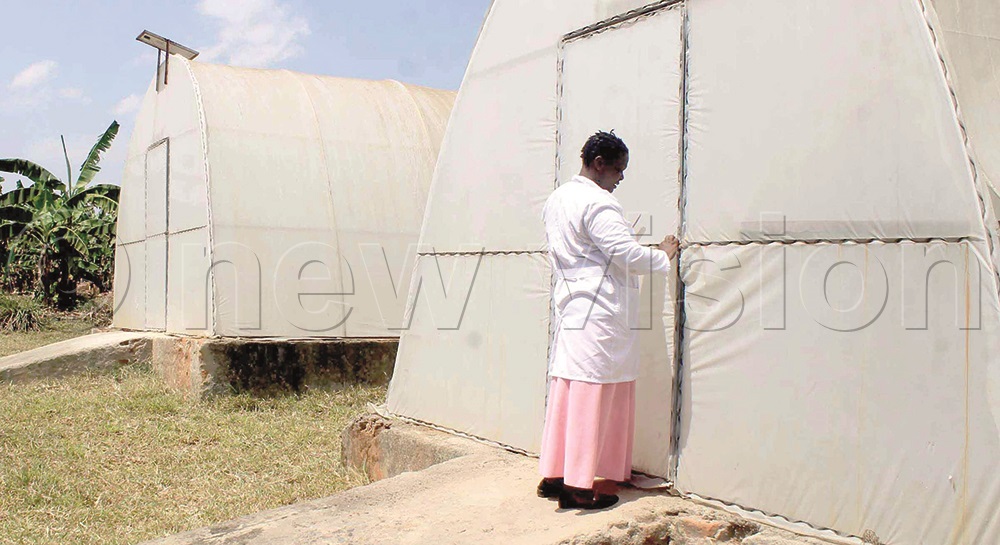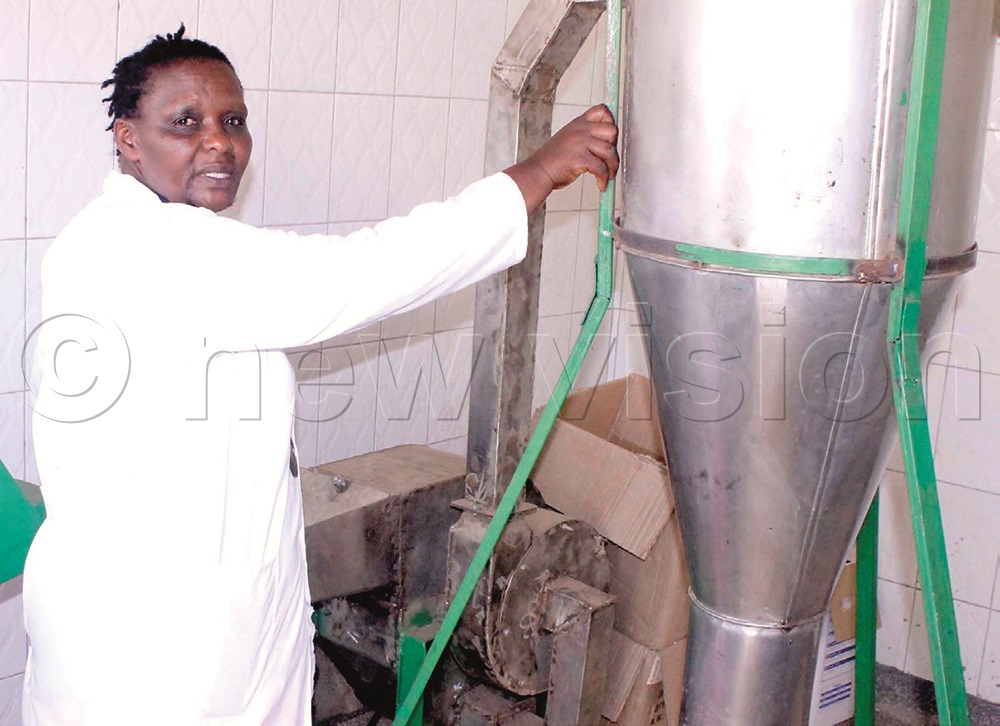Winfred Busingye, an innovative farmer, was in 2010 visited by President Yoweri Museveni as one of the model farmers in Isingiro district.
The Head of State educated her on how she can earn sh20m per year by adding value to matooke. Since then, she has minted money from turning matooke into a variety of products, writes Christopher Ahimbisibwe.
According to agriculture ministry statistics, banana plantation occupies Uganda’s largest cultivated area, making up 38% of the cropland.
Uganda can be described as a rural economy since agricultural activities dominate local livelihoods and involve over 70% of the total labour force of the country.
Banana growing is a major food crop for half of the Ugandan population, and approximately 75% of the Ugandan farmers cultivate it.
Banana plants deliver a continuous supply of food and income through the asynchronous fruiting habit. The government acknowledges the crop’s contribution to household food and income security as a prioritised crop.
Busingye is an innovative farmer based in Isingiro district, western Uganda. She is the proprietor of BWK Foods Limited and a resident of Buyojwa A in Nyamisindo Parish, Masha sub-county, Isingiro district.

Such is her popularity that on July 15, 2010, President Yoweri Museveni visited her as one of the model farmers in her area.
The President’s visit to her farm was an eye opener into value addition because he educated her on how she can earn sh20m per year by adding value to matooke. She decided to do more.
“The training I received from Mbarara District Farmers Association and Isingiro District Farmers Association made me what I am now,” she says.
As of now, Busingye is the vice-chairperson of the Isingiro District Farmers Association which has more than 100 registered farmers.
The association has helped mostly women through training on how they can earn income from agriculture.
As one way of doing something that would bring money to the family, Busingye decided to start poultry farming in 2018. She spent four years in the business.
“Although the business was good, the only challenge was that I would spend heavily on transporting eggs to town and poultry feeds from town to the farm. In the end, I would get no profits because I was spending a lot on transport,” she says.
Besides poultry farming, she also had a banana plantation.
Adding value from bananas
“Among the reasons that forced me into value addition was the nature of the seasons we have as farmers. During the dry season, the business of matooke is down, with a big bunch going for as low as sh1,000 on the farm,” she says.

Value addition was, therefore, intended to improve her earnings. To understand it clearly, one bunch of matooke produces 2-3kg of flour and 1kg goes for sh10,000.
This means that if you sell three kilogrammes of banana flour, you can earn sh30,000 compared to sh1,000 to sh5,000 if you sell them fresh.
Market updates
“It would be good business if people improved their attitude to products from matooke. I am trying to make them like matooke products and at least, the mandazi sector is now a profitable business due to its quality and delicacy,” she says.
For value addition from matooke, she harvests 40 bunches of matooke every month which are used in the factory for flour.
Every day she sells 33 packets of mandazi whereby each packet consists of six mandazi and it is sold at sh2500.
This means every day she earns sh82,500 from mandazi. The price of matooke flour is lucrative, as of now 1kg of banana flour is at sh10,000.
“Before COVID-19, I had a friend who was in Dubai. He would take 50kg of matooke flour every month because he was processing biscuits from banana flour. I do not know what happened to him. I lost the connection which made me downcast,” she says.
Other products from matooke which Busingye produces like chips, pancakes and party cakes are made on order. However, with raw matooke, she was not happy with the price per bunch in June, compared with the labour she put into the banana plantation.
“However, I am not shocked with the price since it is seasonal and the time will come in August when we shall smile again,” Busingye adds.
Every month she can harvest 300- 400 bunches of matooke from her banana plantation.
On days when matooke prices are very high, she sells at an average of sh15,000- 20,000. This means in one month Busingye can collect sh6m from banana plantations.
Storage facilities
She has a storage facility which is divided into different rooms that helps her to keep her produce and final products safe from contamination.
Challenges on the farm
“Every farm has its challenges but we do what it takes to minimise them as we progress,” Busingye says.
The biggest she has on the farm is the challenge of thieves, who have tried to destroy and steal some properties.
Busingye said thieves came last year and destroyed solar equipment that was connected to the driers. Another time thieves came and tried to break one of the stores to steal a milling machine but they failed.
“These are people in our community, who don’t support development and they use this chance to disturb my progress but I already know some,” she adds.
Busingye is now planning to install solar cameras around the area to easily capture thieves.
Marketing and branding
Busingye markets her products on various networks on social media and other links. BWK Foods Limited is well designed to show its specific products and this has made her so unique.
Every product she produces on her farm is well branded with the BWK logo which is fully registered.
Community benefits
As the chairperson of the district farmers association, she has done what it takes to educate women on how they can improve household income.
She has six workers on the farm and all of them are natives of Nyakashaara village, who are learning. They earn a monthly income of sh100,000 and this has boosted their livelihood.
Institutions around Isingiro and different groups of farmers from other districts also use the farm as a training centre.
Process of making mandazi, flour and other products
The farm has got two driers that Busingye constructed in order to facilitate the process of drying the matooke.
- Get bunches of matooke which are ready for harvest from the plantation.
- Clean it, peel the matooke according to your target of the flour (one big bunch of matooke produces 2-3kgs of banana flour).
- After peeling the matooke, wash the peeled fingers and chop them into pieces. You need a chopping machine to make the recommended and equal size.
- After you have chopped your matooke into pieces, take them into the shade house for drying (depending on the climate, it may take 2-3 days to be dried well).
- When the matooke is dried, you then take them to the machine to be milled into flour to have finished product. (She has a moisture tester which she uses to verify whether the matooke dried well).
- The matooke flour is either packed in different measures (kgs) depending on the demand.
- She uses some of the flour to process mandazi.
Future plans
Busingye has big dreams of expanding her farm by introducing zero grazing, starting with four good breeds of dairy cows.
She has already started planting pastures for the animals and also constructing a dam which will reserve water for animals.
With time, she still has a dream of re-introducing poultry keeping again on the farm since now the development is increasing. You travel a long distance going to Mbarara to get poultry feed.
She had planned to do irrigation on her farm to avoid drought which disturbs Isingiro but after constructing the dam, they discovered that the water she was going to use was hard water.
She is now planning on how to treat that water so that it can be used for irrigation. With all the plans she has, she hopes by the time they get electricity on her farm she will be able to turn her farm into a real factory of banana produce.
LEAD PHOTO CAPTION: Busingye displaying some of her products from her matooke value addition facility in Insingiro district.





